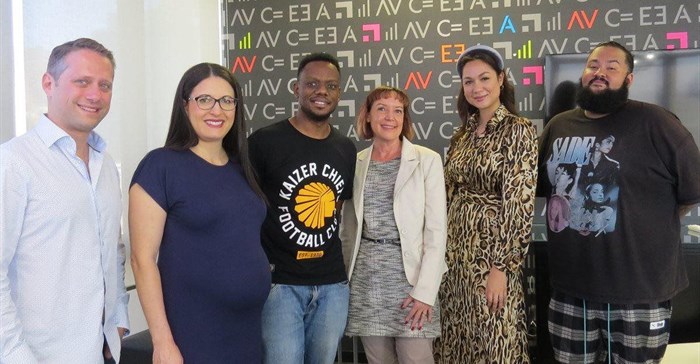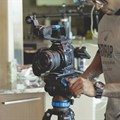![[Behind the Selfie] with... Amanda Sevasti](https://biz-file.com/c/1503/268106.jpg)
Digital influencer marketing in the spotlight

The 12th episode of the IAB Insight Series was held at Kantar's Cape Town offices, situated in the Foreshore on Thursday, 28 November. The panel included:
Amanda Sevasti Alves, head of CX and digital at Publicis Machine; well-known blogger; Aqeelah Harron-Ally from Fashion Breed; rapper turned businessman, Siya Metane from SlikourOnLife; Nicole Capper, MD and owner of Mango-OMC; Hayden Manuel, sportstyle ZA marketing manager at Puma South Africa and Stephane Rogovsky, the CEO and founder of R Squared.
Here, they share their insights on the subject matter, elaborating among other things on how marketers can continue to create effective campaigns in an ever-changing landscape and how local brands can manage their influencer relationships in order to protect and increase their brand equity.
Influencer marketing is becoming such an integral part of the digital marketing landscape and it's constantly growing and evolving. How can marketers keep abreast of all these changes and continue to create effective campaigns?
Alves: Today there are a number of tools that enable marketers to find and manage influencers. But it’s vital to decide on what your objectives and desired results are before using influencer marketing – it should be used and regarded as part of the channel mix for a campaign.
Rogovsky: Marketers can keep abreast of all the changes in the digital marketing landscape by staying informed and ensuring that all aspects are covered by experts. Digital marketing has become extremely broad and diversified and some fields, like influencer marketing, require very specific skills and expertise for projects to be efficiently designed and rolled out while ensuring risk mitigation for brands. I see digital marketing moving towards the status of an umbrella, with experts in different sub-fields teaming up and combining their talents and expertise together for optimised results.
Metane: It’s a balance of listening with tools and also being interested in the influence of these individuals, i.e. why are people resonating with them, how is that linked to the story the brand wants to tell, and what does the collaboration look like? It’s answering these questions and then integrating traditional digital marketing to package both worlds.
Capper: Marketers should watch global trends. South Africa tends to follow them and it’s a useful benchmark for where various marketing tools and tactics are likely to move. There is so much that is being launched, then revised, and then reduced as algorithms are created to counter it (ad blockers, private browsers, Facebook and Instagram privacy laws and more).
So when devising a digital marketing strategy, the benchmark should be “do not annoy your customers”. Choose channels and tools carefully and then monitor the analytics to monitor engagement, views and clickthroughs and adjust if they’re not working. Don’t bombard and don’t lie or misrepresent. This includes the use of influencers.
Manuel: I think it's time marketers get their hands dirty again. The most dangerous place to view the world from is your desk, so go out and immerse yourself in your target audience. Hang out where they hang out and listen to what they're listening to. We need to stop relying so much on metrics and numbers, which take the humanity out of things and most times result in sanitised execution with no feeling.
Harron-Ally:
- Become a follower. To have your finger on the pulse you need to consume and think like the audience. Follow everyone from macro to micro-influencers locally and internationally and actively notice the patterns and trends in both their content and the way other brands are working with them.
- Download podcasts. There are so many about influencer marketing and they're often part of an updated series.
- In South Africa, we’re lucky to be a little bit behind because it means in many ways we can look to our international predecessors as trend forecasters for our own influencer industry. Research what the latest trends are across the pond and evaluate it according to our market.
What are some of the key factors to take into account when creating a powerful dedicated influencer marketing strategy?
Alves:
- Authenticity is key and that’s why carefully identifying which influencers to engage with is the most important step. Are they already fans of your brand or are they just “influencers for hire”?
- How will the brand engage with them and what (if any) remuneration will there be?
- As part of a longer-term marketing strategy, how will you work with the influencers to keep the partnership interesting and relevant?
Rogovsky: Influencer marketing is often integrated within a larger-scale campaign. Unfortunately, influencers are sometimes only selected because they are famous, without any specific strategy, and others are requested to repost brand content from the overall digital marketing campaign. Influencer marketing becomes, however, extremely powerful when the influencer is very authentic and speaking his/her own words in his/her own style.
People follow influencers because they like what they do and the way they do it. Audiences don’t follow in order to see staged branded content. A dedicated influencer marketing campaign is, therefore, powerful when it establishes the perfect framework that fully aligns with the brand’s objective and with the brief, while still allowing for sufficient flexibility for each influencer to create content that is authentic, engaging, tells a story and protects the brand equity.
This is the perfect arrangement to create a strong emotional connection between the influencer’s audience and the brand, while protecting the latter.
Metane: Story... What's the brand story and what's the influencer story? As much as some brands have a historical lineage that has developed what it represents in the market today, the influencer also has something similar, which might not be consciously crafted over years like many brands. Our job, as marketers, is to find that thing that represents the community in an influencer. That "thing" is the authentic pocket in the heart of the consumer.
Capper:
- That the influencer’s content, values and ethics match your brand.
- That you have solid tracking tools in place to measure success and that measurable objectives are clearly defined.
- That the marketing strategy's key messaging, calls to action and narrative are clearly defined and clearly communicated to the influencer.
- That the influencer’s content is included in the 360-degree marketing strategy – resharing/engaging with and supporting the content via owned channels.
- That any paid-for campaigns resonate with whatever the influencer strategy dictates and that there is one narrative across key messages.
- That the website is revised with campaign landing pages that the influencer can link to and that can be measured – help the influencer help you by providing digital platforms that will work for them.
- Respect their channels and work with them to ensure that their voice comes through and that you don’t force your voice onto them. Authenticity is key.
Manuel: Have an always-on approach. How do you behave when you don't have anything to sell? Consistency is the key to building long-term equity. I always advocate for a long-term brand play rather than a short-term campaign approach.
Harron-Ally:
- Before confirming the campaign make sure that the influencer’s audience demographic is the same as your target market. Is it predominantly female? Male? Are they of buying age? These are all things to consider. Have them send you screenshots.
- Brief them properly and put a contract in place that you both have to adhere to and are happy with. Influencer campaigns get messy most often when there isn’t a clear understanding between both parties. The same way a client may request a reshoot if clear instructions are not followed, the influencer may charge for a reshoot if the reshoot is needed due to vague briefing. Everyone’s time and energy is important. All parties are businesses and should be acknowledged as such.
- Be fair and ready to negotiate.
Comment on the current state of influencer digital marketing in SA.
Alves: There is a critical lack of standards and guidelines for brands, agencies and influencers. This has led to all parties sometimes taking advantage of each other. There is also a lack of knowledge around the role influencer marketing plays within the broader advertising and PR landscape. As a result, a degree of disillusionment and negativity has started to set in and we need to course-correct.
Rogovsky: Influencer marketing is an immature field, and yet it’s the fastest-growing segment of digital marketing. Because of its rise, many people want to be part of it, but very few clearly understand it. As a consequence, most people have different definitions/views on what an influencer is, what influencer marketing is, what the metrics to monitor are, etc.
While most people would tend to think that it is a South African issue only and that Europe or the USA are much more advanced in the field, it’s actually not the case, and through the Digital Influencer Marketing Committee at the IAB, South Africa is at the forefront of the landscape harmonisation, standardising all of the above.
Metane: In my opinion, it’s still oversaturated with technology to create solutions and is lacking the emotional intelligence and real connection with people of influence and what they influence. I do think we need the technology at times though as it seems that's the only thing that’s valued.
Capper: It’s a bit of the Wild West. There are a multitude of influencers – micro and macro (and a growth of nano) – and at the moment limited guidelines on how to work with them, which can lead to less than ethical claims being made via their channels, brands not necessarily properly incorporating them, and on the other side, a lack of accountability. But it’s a wealth of opportunity for brands and influencers alike as the world moves further and further into authentic, digital dialogue.
Manuel: I think it has kind of played out because the curtains have been pulled so far back that the strings are showing. The art of influence is supposed to be subtle but because it's such a hot topic, it has lost its efficacy. The audience has become highly sceptical.
Harron-Ally:
- While it keeps getting better, clear communication and understanding of how both influencers and brands' work is still a challenge.
- For the last two years it’s been clear across the board that clients aren’t managing annual budgets correctly, and at year-end putting a lot of pressure on influencers to do a large scope of work on a smaller, highly-compromised budget. This is different compared to earlier in the year when budget requirements are gladly and easily met. There are so many influencers taking on work this time of year in a very forced state and its showing.
- There is a definite shift in consciousness happening on social media. People want value, they want to learn, they want to follow influencers who have substance and care about their audience. They’re interested in stories over hard-sells.
- There are so many new influencers with large followings and incredible potential who don’t treat their platforms as a business and are winging it. Brands truly want to work with them and want fresh faces and perspectives but get frustrated because they don’t have tools like a media kit, rate card and don’t work in a way that indicates the direction their personal brand is moving in. New influencers need to do constant research online on ways to improve their business management skills so that they can form a solid administrative foundation for their platforms and book campaigns successfully. It’s not about how many followers you have but about how well you treat your audience and how well your internal operations run (even if you operate solo).
How can local brands manage their influencer relationship in order to protect and increase their brand equity?
Alves:
- Clearly, state the deliverables and have a written contract in place.
- Have a crisis comms plan ready in case an influencer (or your campaign) receives negative feedback.
- Avoid short-term thinking and chopping and changing influencers. Building brand equity is a long-term goal.
Rogovsky: Every brand wants their campaign to be viral, but many tend to forget that virality can be negative too. Each influencer campaign must be carefully designed to account for risks that are specific to influencer marketing and to campaigns. This must then be accounted for and included in the influencer’s contract/agreement.
As a matter of fact, most of the epic failures happened because a basic agreement or no agreement at all was in place, leading to a misunderstanding in expectations and lack of clarity between the brand and the influencer. A clear understanding of each risk, clarifying everything upfront, and including these risks in the agreement, is the key for a healthy relationship and brand protection.
Last but not least, influencers are experts in growing their audience, and in managing their personal content, but are not marketing experts, and might not have a clear understanding of the applicable industry regulations or brand risk. A strong collaboration between the parties, with the influencer submitting the content for validation to the brand is of the utmost importance.
If the content needs to be rejected by the brand, the influencer marketer should guide the influencer on how to redo, while mitigating the risk, but not redoing the content for the influencer, in order to preserve the authenticity.
Metane: It's understanding and accepting that we in a world of collaboration. Everyone thinks they are a brand or have influence. The only difference with commercial brands is that they have resources.
By developing revenue and engagement standards for the talent and not only the technology we'll be able to create an industry framework where influencers are able to participate willingly and with more clarity.
Capper: Contractually – it really is as simple as that. A good contract sets up the guidelines for both entities and ensures accountability from both sides.
Manuel: Trust them with your brand. Take away as many parameters as you can. Don't recruit people for their uniqueness then tell them to leave it at the door.
Harron-Ally: Identify the influencers you want to work with and set up a meeting or a lunch date where you get to know one another so your interactions become human. Make things fun. Partner with influencers who genuinely love the brand. Discuss one another’s medium to long term goals with full disclosure and consider working together over an extended period or on multiple projects.
Be hands-on and be human first because relationships are crucial for extended brand love and success. Long term relationships that include multiple paid campaigns with regular seeding in between cause influencers to incorporate your product authentically into their lives which means they’re more likely to create organic content around it.
In the end, you get more than you paid for and you get loyalty. Influencer audiences see all of this and not only does love for the brand grow all around, both the client and influencer find a rhythm that works for them making each job more successful and easy!
Standard tickets to attend these IAB Insight events cost R500. Free for IAB members. Email ten.asbai@aluaP for sponsorship opportunities and keep an eye on the IAB SA website or visit Facebook and Twitter for further updates! You can also subscribe to the IAB Insight Series' emailers and don’t miss the IAB YouTube Insight Series.
About Juanita Pienaar
View my profile and articles...











